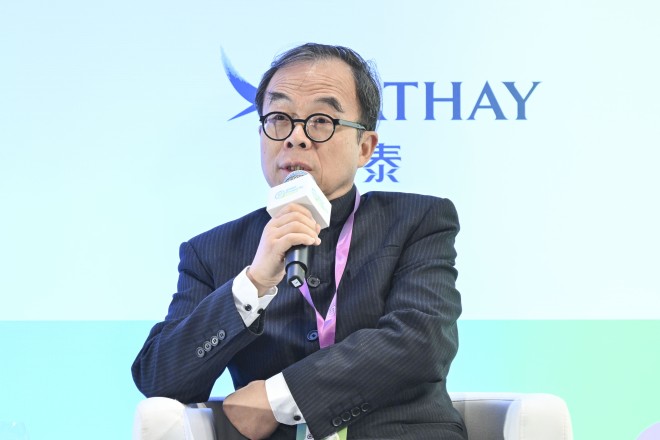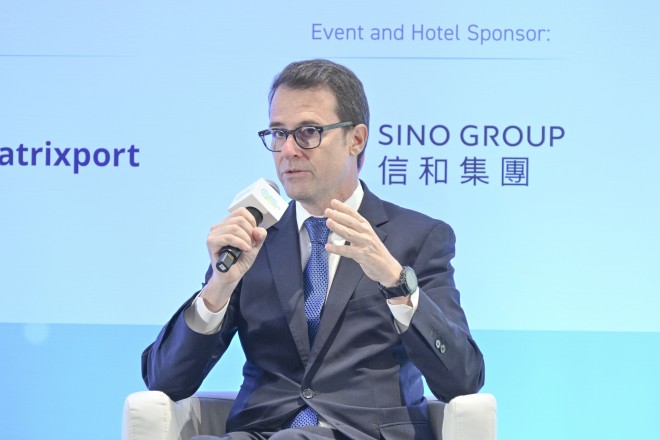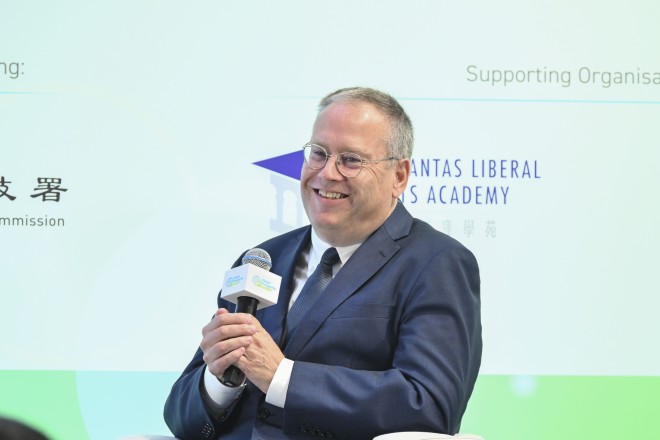[The content of this article has been produced by our advertising partner.]
In the wake of escalating geopolitical tensions, persistent conflicts, and a post-pandemic economic landscape, global prosperity is at a standstill. Hong Kong, with its thriving open economy under the “one country, two systems” principle, is primed to use its position to foster communication among international experts and thought leaders, paving a clear path towards sustainable global prosperity.
A consortium of academic, business, and thought leaders in Hong Kong thus launched the GPS 24. This event served as a hub for luminaries across various sectors, including business, politics, science and technology, and sustainable development, to engage in a global dialogue. The Savantas Policy Institute and the Shanghai Institutes for International Studies (SIIS) were the co-organisers of GPS 24.
Regina Ip, the founder of GPS 24 and Chairperson of the Savantas Policy Institute, underscored the importance of global prosperity in her opening address at the Summit. She observed that while prosperity is vital for our future, the global commitment to its promotion is lacking.
She identified emerging threats to prosperity and the rise of opposing geopolitical blocs. The preoccupation of superpowers with challenges to their global dominance has led to protectionist policies. These policies, including tariff increases, financial sanctions, and export controls, obstruct developing countries’ access to advanced technologies.
A platform for engagement
Many experts at GPS 24, including Professor Huang Ping, echoed Ip’s views. Huang, the Executive Vice President of the Chinese Institute of Hong Kong and Director of the Centre for Taiwan, Hong Kong, and Macau Studies at the Chinese Academy of Social Sciences, highlighted Hong Kong’s unique global position. He described Hong Kong as a bridge not only between China and the US, but also between China and other Western and non-Western countries. He further suggested that Hong Kong could play a significant role in bridging the gaps as a platform for engagement.

A well-differentiated economy
Public-private collaboration is crucial for distinguishing Hong Kong amidst challenges. Mr Iñaki Amate, Chairman of the European Chamber of Commerce in Hong Kong, asserted that while the Government has taken numerous measures to address current economic conditions and attract talent to the city, enticing overseas organisations to establish a presence in Hong Kong is equally, if not, more, important.
Meanwhile, the private sector must diversify and identify the right talent to enhance Hong Kong’s competitiveness, according to Mr Amate.
He advocated for a joint long-term vision for the city by the Government and private sector, with the leadership responding to that vision.
Mr Amate also suggested that a well-differentiated economy should include a broad spectrum of elements. While financial services are undoubtedly a pillar, other essential elements will set Hong Kong apart in the market. He urged Hong Kong to identify the elements which are going to differentiate the city.

A desire to communicate Hong Kong’s outward-facing policy
Kurt Tong, former top US diplomat in Hong Kong, highlighted Hong Kong’s role as a ‘super connector’ between Mainland China and the rest of the world.
Tong suggested that the term ‘super connector’ could be defined in various ways, including cultural communication, business deal-making, and travel and tourism.
According to Tong, the key to leveraging these strengths lies in prioritisation and clear communication by the Government and other stakeholders. This would demonstrate the city’s commitment to an outward-facing policy and outreach, focusing on core messages that can cut through global noise and clearly articulate Hong Kong’s goals.
He emphasised that these messages should convey that Hong Kong boasts a favourable business environment, underscored by a strong rule of law. The city also supports an open media environment, transparent government processes, and predictable policies.

A diversified talent pool
Scientific advancement hinges on the free exchange of information, global mobility of scientists, and international collaboration.
Professor Roger D. Kornberg, a Nobel laureate of 2006, asserted that scientific progress flourishes with contributions from scientists worldwide, including the emerging generation from Hong Kong, Mainland China, and beyond.
He attributed much of the US’s scientific success to international participation, noting that many scientists in America were born overseas. For Hong Kong to realise its scientific advancement goals, Kornberg insisted on the absolute necessity of an international talent pool.
Kornberg is Mrs. George A Winzer Professor in Medicine, Professor of Structural Biology at Stanford University’s School of Medicine.

Hong Kong as the intermediary
According to Professor Yang Jiemian, Chairman of the Academic Advisory Council of the Shanghai Institutes for International Studies, Hong Kong is ideally positioned to serve as the intermediary between Mainland China and the rest of the world.
Under the principle of “one country, two systems”, Hong Kong has developed into a diverse community with extensive connections to many countries and regions, particularly in economic terms. Yang believed that Shanghai, despite its progress, still lags behind Hong Kong in terms of internationalism.
To bolster its role as an intermediary, Yang suggested that Hong Kong should fully exploit its ties in various sectors, including business, culture, education, sports, and religious communities abroad.
Furthermore, he emphasised the importance of nurturing Hong Kong’s youth, as they hold the key to the future of both China and Hong Kong. He asserted that these young individuals can share the authentic narratives of China and Hong Kong with the world, and likewise, bring global perspectives back to their home regions.

Successfully concluded GPS 24
GPS 24 took place from May 13 to 15. The three-day event kicked off with a welcome dinner on May 13, where the Hon John Lee, Chief Executive of HKSAR, delivered a keynote speech.
On May 14, experts and thought leaders led the panel discussions on five critical global issues: deglobalisation; the risks of pan-securitisation; scientific and technological cooperation; great power competition; and climate change. The panel discussions concluded successfully, emphasising global collaboration at various levels to address diverse issues.
The Young Leaders’ Forum, held on May 15, saw visionary young entrepreneurs from across Asia sharing their insights on the region’s economic future.
GPS 24 marked a new milestone in Hong Kong’s efforts to enhance its role in international dialogue on issues critical to advancement of global prosperity. It hopes to inspire others to orchestrate similar exchanges between China and with the rest of the world despite the various challenges remain.

